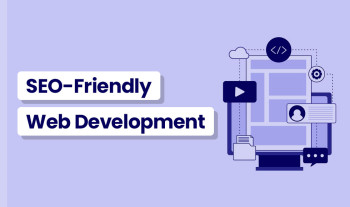Top 9 Back-End Coding Languages for Web Development in 2023
In the ever-evolving landscape of web development, choosing the right back-end coding language is crucial for building robust and scalable websites. As a leading website development company, we understand the significance of selecting the right tools to ensure seamless functionality and optimal performance. In this comprehensive guide, we'll delve into the top 9 back-end coding languages that are reshaping the web development sphere in 2023.
JavaScript (Node.js)
JavaScript, primarily known as a front-end language, has extended its reach to the back end with the introduction of Node.js. This server-side JavaScript framework has gained immense popularity for its event-driven architecture and non-blocking I/O, making it an excellent choice for building scalable and high-performance applications.
Python (Django and Flask)
Renowned for its readability and versatility, Python is a favorite among developers. Django and Flask, two of the most prominent Python frameworks, offer robust features for back-end development. Django is a high-level framework that follows the "batteries-included" philosophy, making it an ideal choice for rapid development, while Flask provides a lightweight and modular approach for flexibility.
Ruby (Ruby on Rails)
Ruby on Rails, often referred to as Rails, is a powerful and elegant framework built on the Ruby programming language. Known for its convention over configuration principle, Rails simplifies complex tasks and accelerates development. This makes it an excellent choice for startups and agile development teams.
Java (Spring Boot)
Java has long been a stalwart in the world of enterprise-level development. With the advent of Spring Boot, a microservices-friendly framework, Java remains a top contender for building scalable and secure back-end systems. Its vast ecosystem and strong community support make it a reliable choice for large-scale applications.
PHP (Laravel)
PHP has been a staple in web development for decades, and Laravel has revitalized its reputation in recent years. Laravel's elegant syntax, extensive features, and expressive code make it an excellent choice for developers seeking a modern and developer-friendly PHP framework.
C# (ASP.NET Core)
Microsoft's ASP.NET Core, built on the C# programming language, is a versatile and open-source framework for building modern, cloud-based, and cross-platform applications. With its strong integration with Visual Studio and robust features, ASP.NET Core is a preferred choice for enterprises aiming for scalability and performance.
Go (GoLang)
GoLang, commonly known as Go, has gained traction for its simplicity, speed, and efficiency. Developed by Google, Go is designed for concurrency and scalability, making it an excellent choice for building back-end systems that demand high performance and efficiency.
Scala (Play Framework)
Scala, a language that combines object-oriented and functional programming, is gaining popularity for building scalable and reactive back-end applications. The Play Framework, built on Scala, offers a developer-friendly environment and is well-suited for real-time applications.
Rust
Known for its focus on performance and safety, Rust is emerging as a promising language for back-end development. With its emphasis on memory safety without sacrificing performance, Rust is becoming a go-to choice for developers aiming to build robust and secure systems.
As a website development company navigating the dynamic world of web development, choosing the right back-end coding language is paramount. Each of these top 9 languages brings its unique strengths to the table, catering to different development needs and preferences. Whether you prioritize speed, scalability, or ease of development, there's a back-end language that aligns with your project goals.
In conclusion, the landscape of back-end coding languages is diverse and ever-expanding. As technology continues to advance, staying informed about the latest trends and tools is crucial for website development companies to deliver cutting-edge solutions. Consider your project requirements, team expertise, and long-term goals when selecting a back-end language, and watch your web development endeavors thrive in the digital realm.










